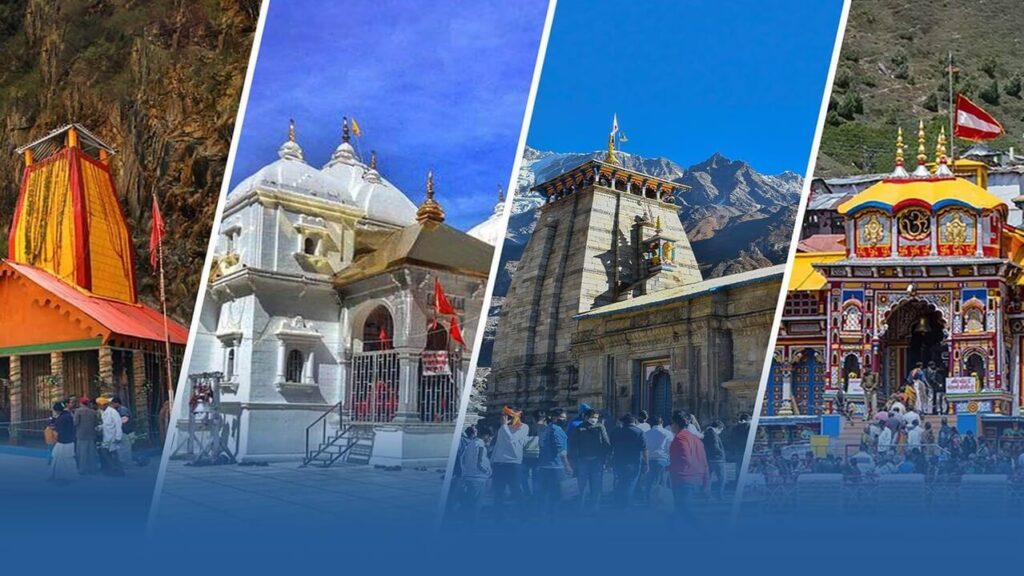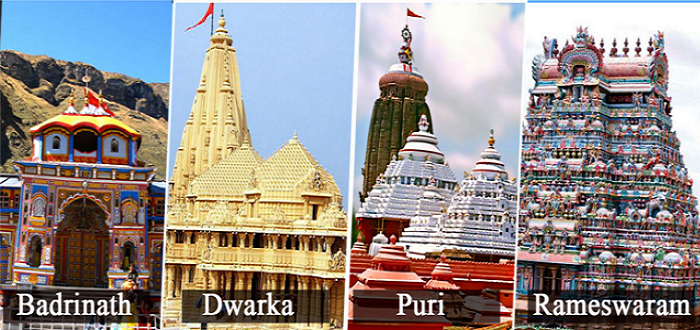India is a land of spirituality, sacred geography, and timeless traditions. Among the many pilgrimage circuits, Char Dham Yatra is considered one of the most significant and holy journeys for Hindus. The term “Char Dham” literally means “four abodes” or “four sacred seats.” These four shrines represent four directions and are believed to open the doors to Moksha (salvation) for those who visit them with faith and devotion.
In this comprehensive guide, we will explore the list of Char Dham temples in India with their states, their mythological significance, architectural details, history, travel routes, and tips for pilgrims.
🛕 What is Char Dham?
The concept of Char Dham was popularised by Adi Shankaracharya, the great 8th-century philosopher and theologian who worked to revive Hinduism and unify its practices across India. He identified four sacred sites in four corners of India:
- Badrinath in Uttarakhand (North)
- Dwarka in Gujarat (West)
- Jagannath Puri in Odisha (East)
- Rameswaram in Tamil Nadu (South)
These shrines collectively form the original Char Dham or All-India Char Dham, separate from the Chota Char Dham circuit of Uttarakhand (Yamunotri, Gangotri, Kedarnath, and Badrinath).
📍 List of Char Dham Temples with States

| Temple | Location (State) | Primary Deity | Significance |
|---|---|---|---|
| Badrinath Temple | Uttarakhand (Chamoli District) | Lord Vishnu (Badri Narayan) | Part of both Char Dham and Chota Char Dham; represents the North. |
| Dwarkadhish Temple | Gujarat (Dwarka) | Lord Krishna (King of Dwarka) | Represents the Western sacred seat; one of the Sapta Puri. |
| Jagannath Temple | Odisha (Puri) | Lord Jagannath (Krishna), Balabhadra, Subhadra | Famous for Rath Yatra; represents the East. |
| Ramanathaswamy Temple | Tamil Nadu (Rameswaram) | Lord Shiva (Ramanathaswamy) | Represents the South; one of the 12 Jyotirlingas. |
1️⃣ Badrinath Temple (Uttarakhand)
🏞️ Location
Situated in Chamoli district of Uttarakhand, at an elevation of 3,133 meters, Badrinath lies between the Nar and Narayan mountain ranges along the Alaknanda River.
🌌 Significance
Badrinath is one of the most important Vaishnavite shrines dedicated to Lord Vishnu. It is believed that Vishnu meditated here while Goddess Lakshmi protected him in the form of a Badri tree, hence the name Badrinath.
🏛️ Architecture
The temple is built in traditional Garhwali wooden style, with a colorful façade resembling a Buddhist vihara. The sanctum houses the black stone Saligram idol of Lord Badri Narayan in a meditative posture.
🗺️ How to Reach
- By Air: Nearest airport is Jolly Grant Airport, Dehradun (315 km).
- By Rail: Nearest railway station is Rishikesh (295 km).
- By Road: Accessible via NH-7 with regular buses from Haridwar, Rishikesh.
2️⃣ Dwarkadhish Temple (Gujarat)
🏝️ Location
Situated in Dwarka, Gujarat, on the banks of Gomti River and facing the Arabian Sea.
🌌 Significance
Dwarkadhish Temple is dedicated to Lord Krishna, worshipped here as the King of Dwarka. Dwarka was Krishna’s kingdom, making this site one of the four principal dhams and a part of Sapta Puri (seven sacred cities).
🏛️ Architecture
Built in Chalukya style, the five-storied temple stands on 72 pillars and has a 78-meter high spire visible from miles away.
🗺️ How to Reach
- By Air: Nearest airport is Jamnagar (137 km).
- By Rail: Dwarka Railway Station connects major cities.
- By Road: Good connectivity with Rajkot, Porbandar, Jamnagar.
3️⃣ Jagannath Temple (Odisha)
🏖️ Location
Situated in Puri, Odisha, on the eastern coast of India, along the Bay of Bengal.
🌌 Significance
One of the Char Dham shrines and a major pilgrimage center, the Jagannath Temple is dedicated to Lord Jagannath (Krishna), along with Balabhadra (Balarama) and Subhadra. The temple is famous for its annual Rath Yatra (Chariot Festival) which draws millions of devotees from across the world.
🏛️ Architecture
Built in Kalinga style of architecture, the temple is a towering 65-meter structure with a massive spire visible from far away.
🗺️ How to Reach
- By Air: Bhubaneswar Airport (60 km).
- By Rail: Puri Railway Station is well connected.
- By Road: National Highway 316 connects Puri to Bhubaneswar and Konark.
4️⃣ Ramanathaswamy Temple (Tamil Nadu)
🌊 Location
Situated in Rameswaram, Tamil Nadu, on Pamban Island connected to the mainland by the famous Pamban Bridge.
🌌 Significance
Dedicated to Lord Shiva, this temple is one of the 12 Jyotirlingas. According to legend, Lord Rama built a Shiva Lingam here to absolve himself of the sin of killing Ravana.
🏛️ Architecture
Renowned for having the longest temple corridor in India, the temple is an architectural masterpiece with intricately carved pillars and sacred tanks (theerthams).
🗺️ How to Reach
- By Air: Madurai Airport (163 km).
- By Rail: Rameswaram Railway Station connects to Chennai, Madurai.
- By Road: Well connected by road and bus services from Madurai and other Tamil Nadu cities.
✨ Spiritual Importance of Visiting All Four Dhams
Undertaking the Char Dham Yatra is believed to:
- Purify the soul and help achieve Moksha (liberation).
- Balance one’s spiritual journey by visiting shrines dedicated to Vishnu, Krishna, and Shiva.
- Bring prosperity, good health, and peace to the devotee’s family.
🗓️ Best Time to Visit
- Badrinath: May to October (closed in winter due to snow).
- Dwarka: October to March for pleasant weather.
- Puri: Open all year; Rath Yatra in June-July is the main festival.
- Rameswaram: October to April is ideal for pilgrimage and sightseeing.
🧭 Travel Tips for Char Dham Pilgrims
- Plan in Advance: Accommodation at Badrinath and Puri gets booked early.
- Health Precautions: Badrinath is at high altitude – carry medicines, warm clothes.
- Respect Traditions: Follow temple dress codes and photography restrictions.
- Local Cuisine: Taste regional prasad and sattvic meals near temple premises.
- Sustainable Travel: Avoid plastic, support local businesses, maintain cleanliness.
Conclusion
The Char Dham Temples of India are not just places of worship – they are living symbols of India’s spiritual diversity, cultural richness, and architectural brilliance. Visiting all four dhams connects devotees with the country’s vast geography, mythology, and history.
Whether you are seeking spiritual solace, cultural exploration, or a once-in-a-lifetime travel experience, the Char Dham Yatra offers it all. With improved infrastructure, better connectivity, and government initiatives like Semicon India, Digital Tourism, and Bharat Darshan circuits, 2025 is an ideal year to embark on this divine journey.

